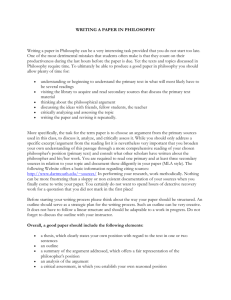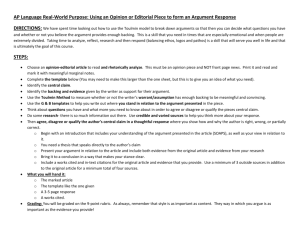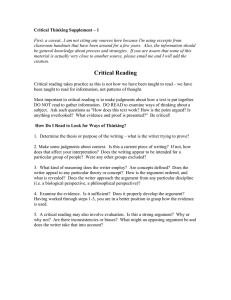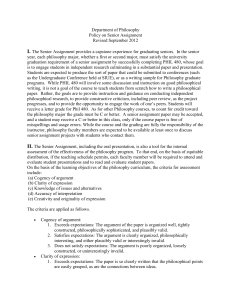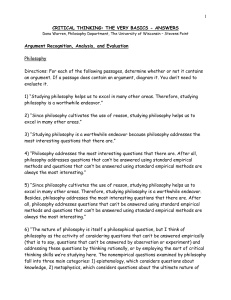Exam Questions
advertisement
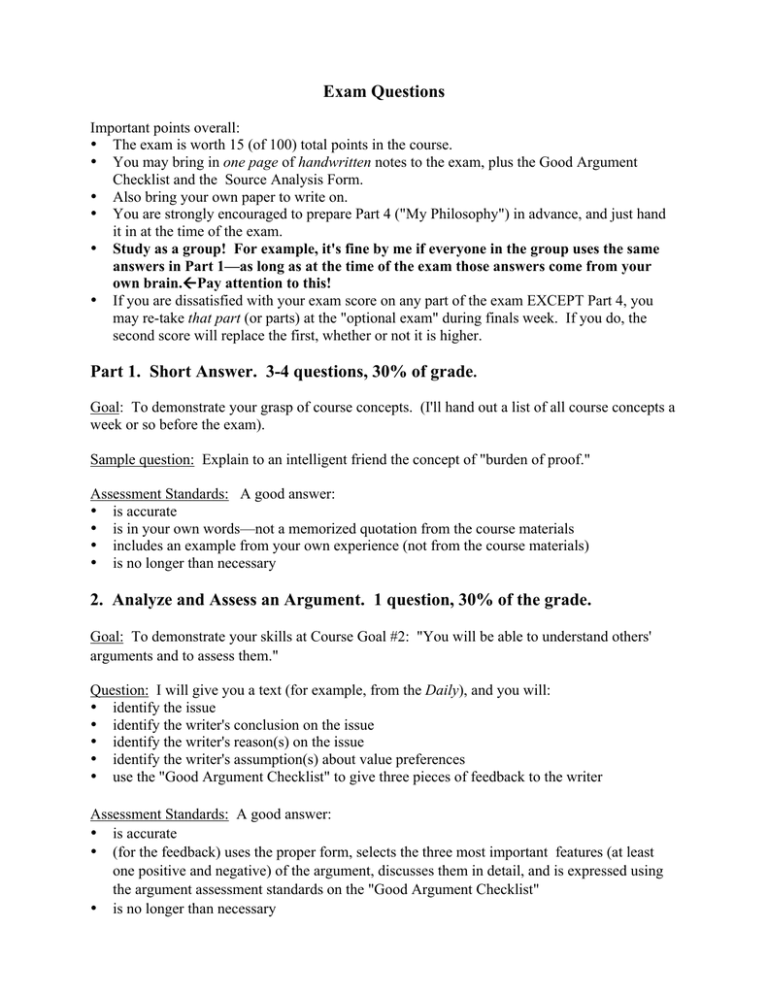
Exam Questions Important points overall: • The exam is worth 15 (of 100) total points in the course. • You may bring in one page of handwritten notes to the exam, plus the Good Argument Checklist and the Source Analysis Form. • Also bring your own paper to write on. • You are strongly encouraged to prepare Part 4 ("My Philosophy") in advance, and just hand it in at the time of the exam. • Study as a group! For example, it's fine by me if everyone in the group uses the same answers in Part 1—as long as at the time of the exam those answers come from your own brain.Pay attention to this! • If you are dissatisfied with your exam score on any part of the exam EXCEPT Part 4, you may re-take that part (or parts) at the "optional exam" during finals week. If you do, the second score will replace the first, whether or not it is higher. Part 1. Short Answer. 3-4 questions, 30% of grade. Goal: To demonstrate your grasp of course concepts. (I'll hand out a list of all course concepts a week or so before the exam). Sample question: Explain to an intelligent friend the concept of "burden of proof." Assessment Standards: A good answer: • is accurate • is in your own words—not a memorized quotation from the course materials • includes an example from your own experience (not from the course materials) • is no longer than necessary 2. Analyze and Assess an Argument. 1 question, 30% of the grade. Goal: To demonstrate your skills at Course Goal #2: "You will be able to understand others' arguments and to assess them." Question: I will give you a text (for example, from the Daily), and you will: • identify the issue • identify the writer's conclusion on the issue • identify the writer's reason(s) on the issue • identify the writer's assumption(s) about value preferences • use the "Good Argument Checklist" to give three pieces of feedback to the writer Assessment Standards: A good answer: • is accurate • (for the feedback) uses the proper form, selects the three most important features (at least one positive and negative) of the argument, discusses them in detail, and is expressed using the argument assessment standards on the "Good Argument Checklist" • is no longer than necessary 3. Assess a Source. 1 question, 30% of grade. Goal: Demonstrate your skills at Course Goal #4, "You will be able to assess the reliability of information sources, especially those you find online." Question: I will give you a copy of a webpage, and tell you a piece of information I want to use from it. You will assess the source, going through the three steps in detail, and coming to a final judgment as to whether you would rely on this information in a debate. Assessment Standards: You are being graded on your thinking. A good answer: • explains accurately and in detail how you identify the person(s)/organization(s) responsible for the webpage and website • applies the four "Big Questions" accurately and in detail • comes to a reasoned and well-explained final judgment • is no longer than necessary 4. My Philosophy. 1 question, 10% of grade. Goal: To demonstrate your skills at Course Goal #6: "You will achieve a significant personal goal that you set for yourself." Question: In one page, raise an important question in the philosophy of argument, answer it, and defend your answer. Essentially, I am asking you to hand in a draft of the final philosophy paper, due finals week. See the "My Philosophy" assignment for full details. Assessment Standards: A good answer: • takes a clear and personal position on any one of the five philosophical questions about argument listed on the assignment sheet (or any other philosophical question you've gotten my approval for). • defends that position with good arguments drawn from your life experience, the course readings, class discussions and your general knowledge. • is not padded and has no "fluff." Remember: Study as a group! Bring in one page of handwritten notes! Write "My Philosophy" in advance!

